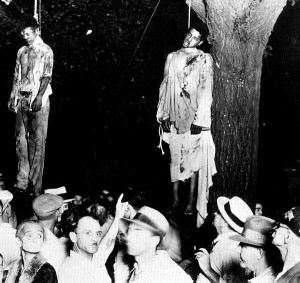Bootlegging, women, sex and violence were a steady ingredient of the life of the black in the Southern states. When you read the biographies of blues artists, you will find those components in varying degrees again and again in most of their careers. Next to blues singing which very frequently dealt with sex (more or less openly and quite often as a ‘double entendre’ or hokum ) some blues artists also had a lucrative activity as bootlegger. Many a blues artist died by an act of violence. The most well known story is of course this of Robert Johnson who was poisoned by a jealous husband after Robert having flirted with his wife. Sonny Boy Williamson I was killed in a mugging in Chicago when he walked home after a gig. Blues stars as Muddy Waters and Howlin’ Wolf all did carry a shot gun, and were not afraid to use their fists to forward a more convincing argument in a debate over whatever seemed important.
However, one aspect of this blues environment which is very often not highlighted is the lynching as an integral part of the social context in which black people had to survive. True, after the Civil War the Afro Americans had been freed as slaves, but the Jim Crow-laws didn’t make life much more comfortable. Slavery provided for a stable social environment in which they were handled as precious property; their freeing as slaves didn’t involve their freeing as human beings. The fierce segregation that ruled in the Southern States and in which blues flourished manifested itself in the must cruel way in the high incidence of lynching.
The history of lynching in the States (North and South) is a topic which is a study object in itself; despite several attempts from both white and black politicians and civil right fighters, it was only a few decades ago that a white person was convicted for having lynched a black man.
Lynching was a common practice in the Southern States, which was one of the instruments used by the white population to maintain social order and to stress the “supremacy” of their race. It was not limited to actions from the Ku Klux Klan but was widespread also in other regions where the KKK was not active. It also happened in the Northern States, but it was particularly frequent in the ‘Black Belt’ : Mississippi, Georgia, Louisiana, Alabama en South Carolina. Crime statistics are of course not readily available, and all depends on what was considered then as ‘lynching’, but some studies quote a few thousand victims in the first half of the twentieth century. This is to be considered as a serious underestimation of the real figure; most of them went probably unrecorded for history books.
It happened in all various forms, testifying of pure bestiality and disregarding any respect for the human being. I won’t quote any details because they are too disgusting. Fact is that any reason was enough to get lynched as a black : looking at a white women, addressing a white man carrying a pocket knife, acting suspiciously, gambling,…. The slightest motive was sufficent to shoot a black man and/or hang him on a tree after having been dragged through the streets (burnt or not yet burnt), much to the amusement of the white population, young and old.
After having seen a picture of the lynching of two black Americans, the (northern) teacher Abel Meeropol couldn’t chase the image out of his mind and wrote a poem about the ‘strange fruit’ that grew on trees in southern States :
Southern trees bear strange fruit,
Blood on the leaves and blood at the root,
Black body swinging in the Southern breeze,
Strange fruit hanging from the poplar trees.
Pastoral scene of the gallant South,
The bulging eyes and the twisted mouth,
Scent of magnolia sweet and fresh,
Then the sudden smell of burning flesh!
Here is fruit for the crows to pluck,
For the rain to gather, for the wind to suck,
For the sun to rot, for the tree to drop,
Here is a strange and bitter crop.
In 1939 Billy Holiday put the song on record, and it has been on the repertoire of many artists ever since. Trijntje Oosterhuis, a Dutch jazz singer issued in 1994 a magnificent album called ‘Strange Fruit’.
This Strange Fruit hanging on the Southern States was part of the environment in which the blues was written and sung. Perhaps, it makes us understand why the blues has never been an instrument of social protest : if even looking at a white woman was considered as an act of rape, leading most often to mob lynching, just imagine how the white population would have reacted if the blues singer dared raising questions about the injustice he noticed all around him !
(Photo : Laurence Beitler)


